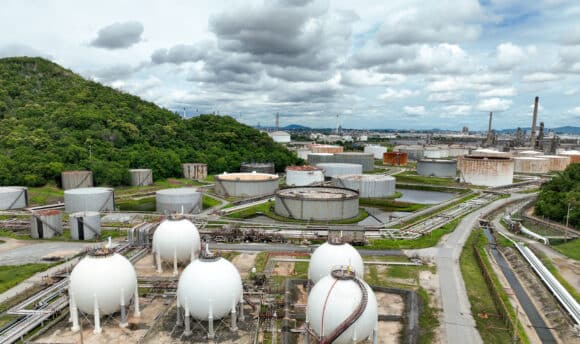Following an unprecedented investor challenge for climate action at the largest U.S. fossil fuel insurers last year, Chubb is again facing two resolutions from shareholders addressing the insurance giant’s fossil fuel business and overall carbon footprint. And like last year, Chubb has issued no-action requests with the SEC in an attempt to silence shareholders’ climate concerns, according to Green Century Funds.
Green Century Funds has filed a resolution calling on Chubb, alongside The Hartford and Travelers, to adopt a timebound phase out of “underwriting risks associated with new fossil fuel exploration and development projects.” A similar proposal was approved by the SEC last year, despite challenges from all three insurers, and went on to earn notable support from Chubb shareholders. (The Hartford and Travelers have not challenged the resolutions this year.)
Shareholder advocacy group As You Sow has also filed a resolution, as it did last year, calling on Chubb to issue a report “disclosing 1.5ºC aligned medium and long-term GHG targets for its underwriting, insuring, and investment activities.” In 2022, the SEC took no issue with this language, and it garnered support from a resounding 72% of shares cast at the annual meeting.
“Chubb’s investors issued a clear mandate for climate action last spring. In response, CEO Evan Greenberg publicly rebuffed them, stating that Chubb would continue to insure ‘sustainable’ oil and gas expansion projects and would not commit to setting a long-term emissions reductions goal. In its challenges to the SEC, Chubb is attempting to avoid accountability for its role in propping up fossil fuel expansion and fueling the climate crisis. But when these resolutions go to a vote, as we expect them to, investors will again have the opportunity to demand concrete action. Will Evan Greenberg continue to show disregard for investors’ legitimate concerns while trying to present Chubb as taking meaningful steps to address climate risk?”
In its no-action requests this year, Chubb argues that Green Century and As You Sow’s proposals should be omitted from the company’s proxy statement because both proposals have already been substantially implemented. Chubb claims that it has publicly outlined its “strategy and approach for aligning its underwriting, insuring and investment activities” with a 1.5ºC pathway, citing its existing “support” of achieving net-zero emissions by 2050, policies on coal and oil sands, and existing emissions disclosures.
However, these steps remain wholly inadequate and far from aligning the company with 1.5ºC. According to data from Insuramore commissioned by Insure Our Future, Chubb is among the top six global fossil fuel underwriters. Our research has linked the company to oil and gas expansion projects in Brazil, the Arctic, Australia, and beyond. Furthermore, Chubb has not committed to reduce its own emissions to net zero by 2050 or disclosed any interim emissions reduction targets, nor has it detailed its plans or criteria for engagement with high-emitting clients.
Although Chubb was the first U.S. insurer to adopt a coal policy, it is now a global laggard when it comes to limiting fossil fuel business. Chubb’s coal policy has not been updated since its adoption in 2019 and is rife with loopholes that allow it to continue to insure new coal mines. Meanwhile, global peers have moved beyond coal; to date, 13 companies, including some of the largest insurers and reinsurers in the world, have committed to end or restrict underwriting for new oil and gas production.



